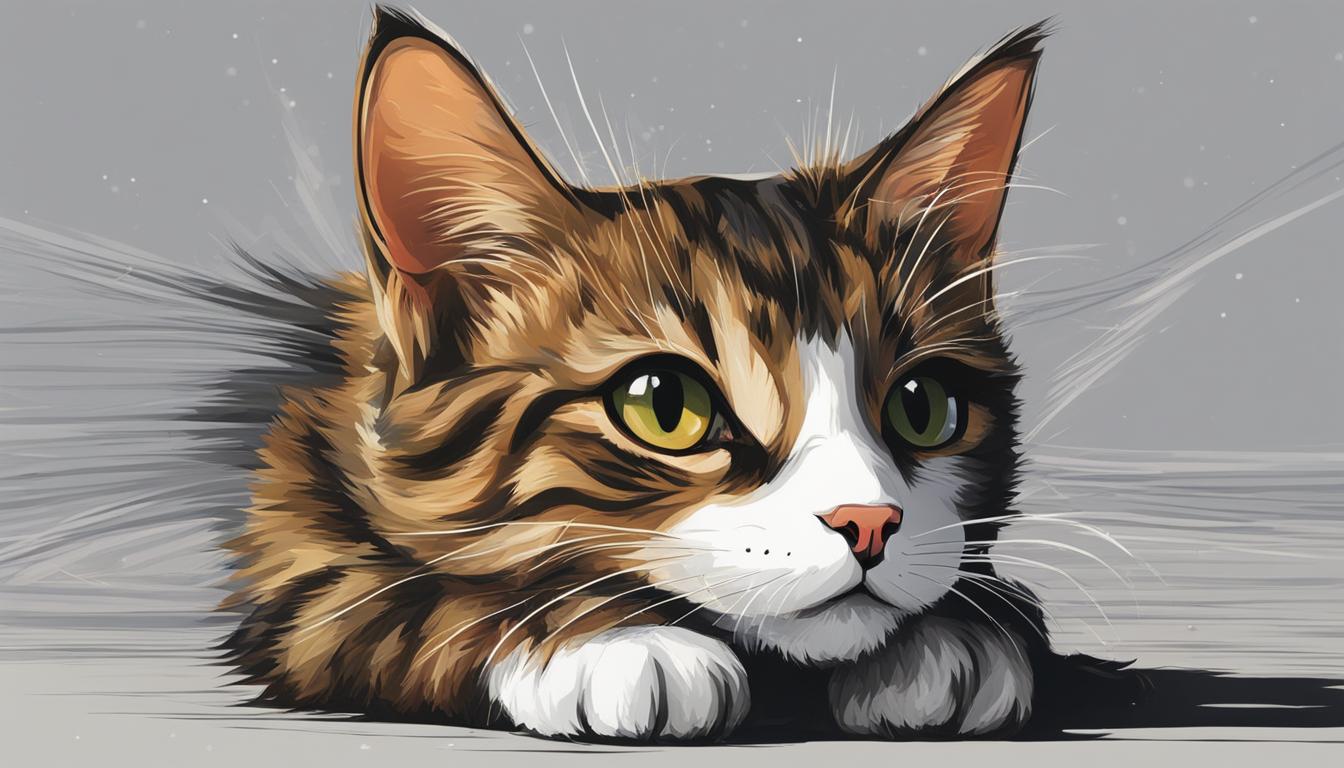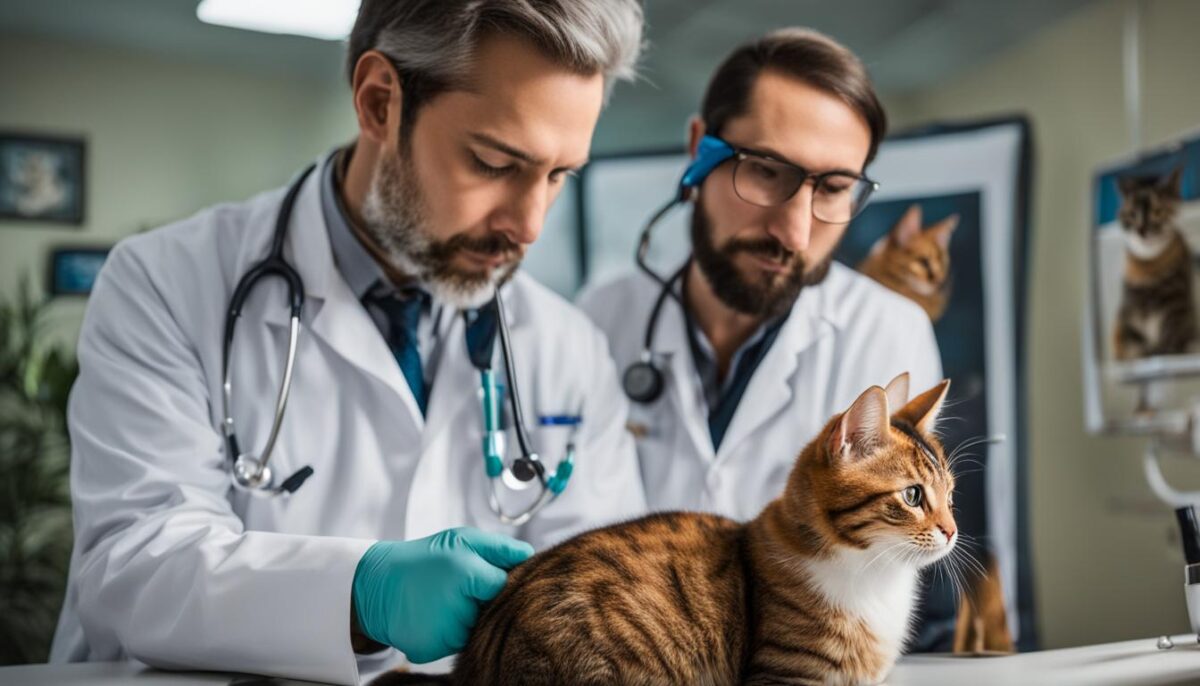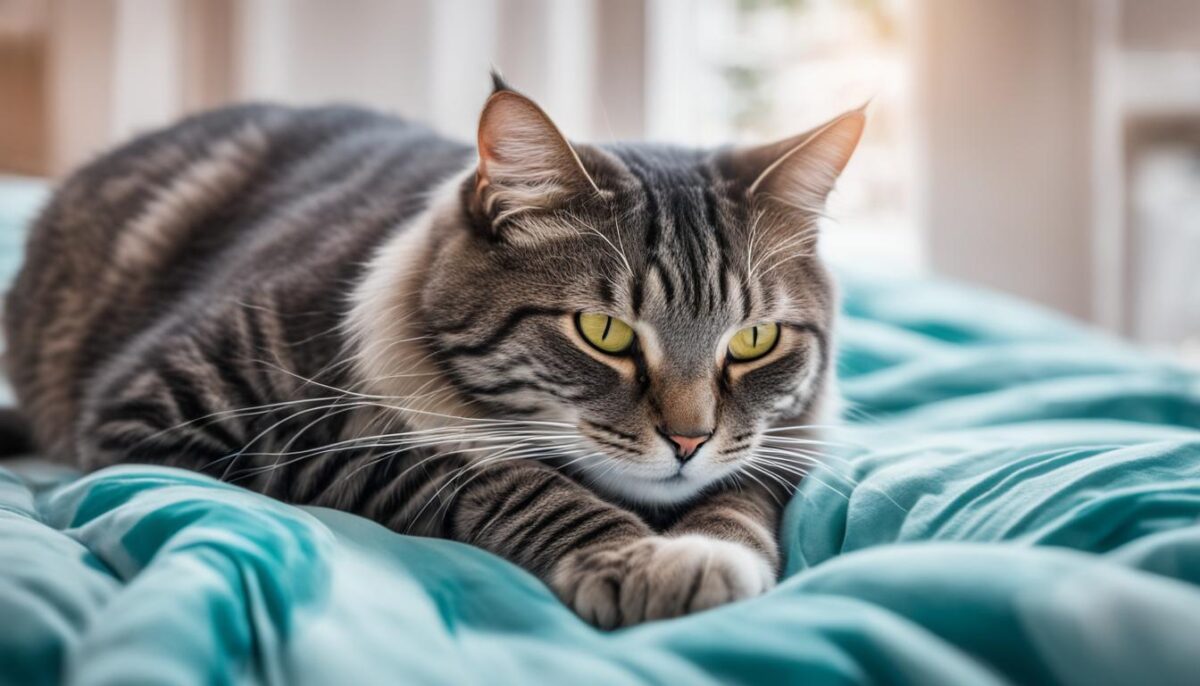Have you ever felt dizzy after spinning around? Well, your cat can feel dizzy too! Just like you, cats have a special part in their ear that helps them stay balanced. Sometimes, this part can have a problem, and your cat might seem like it’s having trouble standing up or walking straight. Your furry friend might even get sick to its stomach if the world seems to be spinning around. This is known as Feline Vestibular Disease, and it’s more common in older cats but can happen to younger ones as well.
When a cat gets suddenly dizzy, it can be a bit scary. But don’t worry, with a vet’s help, many cats start feeling better in just a few weeks. If you see your cat acting dizzy, walking funny, or being sick, it might have something called cat dizziness or feline vertigo. Cats feel dizzy because their balance system in their ear isn’t working right. It’s like when you spin around and then stop, but you still feel like you’re spinning. That’s what your cat feels when it has symptoms of dizziness.
Are you wondering, Can cats experience vertigo? Yes, they can! And it can be scary, but most times, it gets better. So, if you think your cat feels dizzy, it’s time to go to the vet.
Key Takeaways
- Inner ear troubles can make cats dizzy, just like you.
- Older cats can get dizzy more than younger cats, but all cats can have this problem.
- If your cat looks dizzy or sick, it might have Feline Vestibular Disease.
- Cats with dizziness might walk funny, be sick, or move their head in a strange way.
- Always take your dizzy cat to the vet. With care, they can feel better soon!
Understanding Feline Vestibular Disease: The Inner Ear’s Role
Have you ever watched a cat jump from high up and land on its feet? It’s pretty amazing, right? Cats can do this and walk on thin fences without falling because they have something special in their ears. This is called the vestibular system, and it helps cats stay balanced. Think of it like a video game that keeps track of where your cat is in the room, so it doesn’t bump into things or tip over.
What Is the Vestibular System?
The vestibular system is a part of your cat’s inner ear and brain that works as a big boss for balance. It tells your cat if it’s standing up straight, lying down, or turning around. Your cat’s super skills in jumping and running are all thanks to this system knowing where its body is all the time.
How Vestibular Disease Affects Your Cat’s Balance
But what happens if this big boss of balance gets confused? Sometimes, cats can get a little sick in their vestibular system. When this happens, it’s like their balance boss is sending wrong messages to their body. Your cat might get a head tilt, or it might start walking funny, like it’s not sure where the floor is. This can be a bit scary for them, because they might feel dizzy and not walk straight, and they could fall over. It’s like when you spin around a lot and then stop—you feel all wobbly. That’s what it’s like for cats too.
If you see your cat looking like it’s having trouble walking or it keeps leaning to one side, it could have something called feline ataxia, which is a fancy name for being wobbly. It’s important to be gentle with your cat and take it to the vet if you see any of these signs. The vet knows just what to do to help your cat feel better and get its balance boss back in charge.
Recognizing the Signs of Feline Dizziness
Have you ever noticed your cat acting a little funny and not its usual stealthy self? Maybe it’s showing Symptoms of Feline Dizziness. A dizzy cat might do things like walking in tight circles, like it’s chasing its tail. Or it may just fall over when trying to walk.
When a cat feels the room spinning, it’s not just clumsy; it could be a health thing called Cat Vestibular Disease. Here are some things to watch out for so you can Recognizing Cat Vertigo:
- Head is tilted, like it’s listening to something far away
- They might move their eyes back and forth really fast; it’s called nystagmus
- Falling to one side as if they lost their balance
- Throwing up because they’re super dizzy
- Even part of their face might look a little droopy
Cats are usually graceful and sure-footed, so these Signs of Cat Vestibular Disease are easy to see. If your kitty starts doing any of these things, it might need a check-up to help it feel better. It can be scary to see your furry friend feeling all wobbly, but the vet can help find out what’s going on and how to help.
Exploring the Causes Behind Feline Vertigo
Every pet owner wants their furry friends to be healthy and happy, but sometimes cats can get dizzy. Just like people, cats can suffer from vertigo. Understanding why cats get dizzy is important to help them feel better. Let’s dive into what might make a cat feel like the room is spinning.
When Infections Lead to Imbalance
Often, an ear infection might be the culprit behind your cat’s dizziness. When your cat’s ears are not healthy, it can lead to a lot of problems with balance. Feline inner ear health is super important because it helps your cat stay upright and jump without falling. If something’s not right there, your cat could get wobbly and have a hard time with its normal, agile life.
Other Health Issues That Could Lead to Dizziness in Cats
- Thiamine Deficiency: Cats need vitamins just like us, and if they don’t get enough of a vitamin called thiamine, they might start feeling dizzy.
- Feline Infectious Diseases: Sometimes a sick kitty might be dizzy because of a disease like FIP, which stands for Feline Infectious Peritonitis.
- Idiopathic Causes: Big word alert! Idiopathic means that sometimes even the vet isn’t sure why a cat is dizzy. It can be a mystery.
It’s super important to keep an eye on your cat’s behavior and health. If you notice anything strange, like your cat is walking funny or seems off-balance, don’t wait to get help. Remember, lots of feline health conditions can be taken care of when caught early. Stay tuned to your cat’s needs, and they will thank you with purrs and cuddles!
Diagnosis: How Vets Identify Vestibular Disorders in Cats
When your cat seems to be spinning or can’t walk straight, a visit to the vet can help figure out what’s wrong. The vet will give your cat a Veterinarian Physical Exam and maybe do some other tests too.
Physical Exams and Beyond: The Vet’s Approach
First, the vet will check your cat from head to tail. They might look deep into your cat’s ears or watch how it walks. This helps them see if your cat is dealing with Diagnosing Cat Dizziness.
Navigating the Diagnostic Tests for Vestibular Disease
If the vet needs more clues, they might take some of your cat’s blood or use an x-ray machine to peek inside your cat’s head. Here are some tests they might use:
- Feline Diagnostic Tests: Your pet might get its blood checked to look for signs of trouble.
- Vestibular Disease Screening: The vet might test your cat’s head-tilt and the way it walks.
- Cat Health Evaluations: If the vet thinks it’s serious, they could send your cat to a cat brain doctor.
| Test | Why It’s Done | What It Finds |
|---|---|---|
| Ear inspection | To look for infections | Signs of ear problems |
| Blood Work | To check overall health | Causes not seen outside |
| X-rays | To look inside the head | Problems like injuries |
| Referral to a Neurologist | For more complex cases | Detailed brain issues |
The vet will take all this info and try to figure out why your cat feels dizzy. With the right tests and some careful checking, they can help your cat feel better!
Treatment Options for Cats Suffering From Dizziness
If your cat is feeling dizzy, there are different ways your vet might help. Treating Cat Dizziness often starts with finding out what’s wrong. If it’s an infection, your vet can give medicine to make the dizziness go away. If your cat has a growth, sometimes they might need surgery to fix it. But what if the vet can’t find the reason for the dizziness? They’ll help your cat feel okay while it heals on its own. Your vet might also give medicine to stop the sick feeling in their tummy. They will show you how to care for your cat while it gets better at home, like giving it food and water and helping it use the litter box.
Let’s look at Feline Vestibular Disease Therapy options that the vet might offer:
- Medicines to fight infections
- Surgery if there’s something inside that shouldn’t be
- Medicines to help with feelings of sickness
- Special care tips for you to help your cat at home
Sometimes, dizziness can come from problems that aren’t easy to see. That’s when Veterinary Care for Vertigo is important. Vets can give your cat special care to make sure it stays safe and cozy while it gets better.
| Treatment Type | What It Helps With | How It Helps Your Cat |
|---|---|---|
| Medications | Infections | Kills the germs that make your cat dizzy |
| Surgery | Growth Removal | Takes out what doesn’t belong and eases the dizziness |
| Supportive Care | Unexplained Dizziness | Keeps your cat comfortable while it recovers at home |
Remember, every cat is special, and your vet is there to find the best way to stop the dizziness. Don’t worry, they know just what to do!
Recovery and Management of Vestibular Disease in Cats
When your cat has been dizzy, it can be scary. But after the first couple of days, your cat will start to get better. Over a few weeks, you’ll see your pet feeling more like itself. Even if they still have a tilt in their head, the dizziness goes away. It’s important you help your cat during this time, so it’s safe and eats well.
What to Expect During Your Cat’s Recovery Period
Cats can heal from being dizzy, and you can help them! Keep their space quiet so they feel calm. Make sure their food, water, and litter box are close by. If your cat looks dizzy, give them a gentle pat and talk softly to them. You’re their family, and they need your love to recover.
Long-Term Management and Care for Feline Vertigo
Some cats might still tilt their heads even after they get better. If your cat seems stressed, take a slow breath and pet them gently. This can help them feel better too. Your vet can tell you how to care for your cat at home. Turning on a night light can help your cat see at night and feel safe while walking.
Here are more tips for taking care of your cat at home:
- Make sure they stay away from stairs or high places. Your cat could fall and get hurt.
- Keep their bed warm and comfy. It helps them rest and heal faster.
- If your cat feels sick, your vet may tell you to give them special food or medicine.
Remember, your friend can get through this with your help and Ongoing Support for Vestibular Disease. Always call your vet if you have questions about Post-Treatment Care for Cats.
Hearing Stories: Feline Vertigo Cases and Outcomes
When we hear about Vestibular Disease Stories, we learn so much about our furry friends and how strong they are. Cats, like us, can feel dizzy, but they can also get better over time. Each cat has its own tale of recovery. For example, there was a cat that became dizzy after a simple ear cleaning by the vet. At first, it wouldn’t eat and seemed really unsteady. But, after getting some love and care at home, the cat felt all better after just 10 days.
If you have a kitty that’s facing something similar, reading about Feline Recovery Experiences can give you hope. It’s true that some cats might feel dizzy for different reasons. They might need different kinds of help to get better. But knowing that other cats have gotten through this can be comforting. The stories of Cat Vertigo Cases can show us that things can turn around for our feline pals.
| Cat’s Age | Symptoms | Recovery Time | Follow-Up Care |
|---|---|---|---|
| 9 years | Unsteady movement, loss of appetite | 10 days | Home care, monitoring |
| 4 years | Head tilting, nausea | 2 weeks | Medication, special feeding |
| 7 years | Circling, tilting, falling | 3 weeks | Supportive therapy, environmental adjustments |
Remember, when your cat is showing signs of being dizzy, it’s always best to talk to a vet. They can help your cat the most. While it might be worrying, with the right care, many cats can feel like themselves again.
Conclusion
When your cat starts acting dizzy, it can be a little scary. You might see them wobble, or they seem confused about where they are going. But understanding what might be happening is the first step to helping them. This dizzy feeling is often because of something called feline vestibular health, and vets know a lot about it.
If you notice your cat is not quite acting like themselves, like if they’re falling down, or their eyes are moving in a funny way, it’s a good sign to take them to the vet. Vets are like doctors for animals; they can really help. They have special tools that let them look at your cat’s ears and brain and figure out why they are feeling dizzy.
Once your cat gets checked out, the vet might give them medicine or suggest ways you can care for them at home. With your support and patience, your cat with vertigo can get back to jumping and playing just like before. Always keep an eye on them and help them feel safe as they get better. Your furry friend will appreciate all the love and care you give them while they’re on the mend.
FAQ
Can cats experience dizziness similar to humans?
Yes, cats have an inner ear system that is crucial for their balance, similar to humans. If something goes wrong with this system, cats can get dizzy and struggle with posture and coordination.
How does feline vestibular disease affect a cat’s balance?
Feline vestibular disease disrupts the inner ear and brain communication, causing disorientation and making cats exhibit symptoms like head tilting, walking difficulty, and loss of balance, also known as feline ataxia.
What are the symptoms of dizziness in cats?
Symptoms of feline dizziness can include head tilting, walking in circles, falling or leaning to one side, rapid eye movement, and vomiting. A droopy facial appearance may also be observed in some cases.
What might cause a cat to feel dizzy?
Dizziness in cats can be caused by inner ear infections, brain infections, thiamine deficiency, conditions like Feline Infectious Peritonitis (FIP), or even idiopathic reasons, where the exact cause of dizziness is unknown.
How do vets diagnose vestibular disease in cats?
Vets diagnose vestibular disease in cats through a combination of physical exams, checking for ear infections, and potentially conducting blood work, x-rays, and advanced imaging like MRI or CT scans, often with the help of a veterinary neurologist.
What are the treatment options for cats with vestibular disease?
Treatment options vary depending on the cause. Options may include medications for ear infections, surgery for tumor removal, supportive care, and management of symptoms if the cause is idiopathic.
What is the recovery period like for a cat with vestibular disease?
The recovery period can last a few weeks; cats may start feeling better within a couple of days, but might still exhibit some symptoms, like a residual head tilt. Supportive care at home is essential during this time.
Can a cat fully recover from feline vestibular disease?
Many cats can make a full or near-full recovery. Some may retain minor symptoms like a slight head tilt. Each cat’s recovery will vary, and a veterinarian’s guidance is crucial for the best outcome.
Are there any notable recovery stories of cats with feline vertigo?
Yes, many cats have successfully recovered from vestibular disease. For instance, a 9-year-old cat experienced dizziness after an ear cleaning but returned to normal within 10 days with proper care and monitoring at home.


